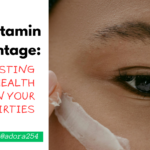Inflammation is the body’s natural response to injury or infection, but when it becomes chronic, it can lead to various skin issues such as acne, eczema, psoriasis, and premature aging. While topical treatments can help, addressing inflammation from within offers more lasting results.
One of the most effective internal solutions is Omega-3 fatty acids—essential fats that the body cannot produce on its own. These healthy fats, primarily found in fish like salmon, mackerel, and plant-based sources such as chia seeds and flaxseeds, have powerful anti-inflammatory properties that can significantly benefit skin health.
In this article, we’ll explore how Omega-3 fatty acids work to reduce inflammation in the skin, their benefits for common skin conditions, and how you can incorporate them into your diet for glowing, healthy skin.

What Are Omega-3 Fatty Acids?
Omega-3 fatty acids are a group of polyunsaturated fats that play a crucial role in maintaining cellular health. The three main types are:
- Eicosapentaenoic Acid (EPA) – Found in fatty fish and fish oil, EPA is known for its potent anti-inflammatory effects.
- Docosahexaenoic Acid (DHA) – Also found in fish, DHA supports skin cell membrane integrity, ensuring that skin stays hydrated and resilient.
- Alpha-Linolenic Acid (ALA) – A plant-based Omega-3 found in flaxseeds, chia seeds, and walnuts. While less potent than EPA and DHA, the body can convert a small amount of ALA into EPA and DHA.
How Omega-3 Fatty Acids Reduce Inflammation in the Skin
1. Inhibition of Inflammatory Pathways
Omega-3 fatty acids reduce inflammation by blocking inflammatory pathways at the cellular level. When the body processes Omega-3s, it produces resolvins and protectins—compounds that help resolve inflammation rather than exacerbate it.
A study published in The Journal of Clinical Investigation found that EPA and DHA reduce the production of inflammatory cytokines such as interleukin-1 (IL-1) and tumor necrosis factor-alpha (TNF-α), which are often elevated in inflammatory skin conditions like acne and psoriasis. By limiting these cytokines, Omega-3s can help soothe redness, swelling, and discomfort.

2. Balancing Omega-6 to Omega-3 Ratio
Modern diets tend to be high in Omega-6 fatty acids, which, when consumed in excess, can promote inflammation. Omega-3s help balance this ratio, counteracting the pro-inflammatory effects of Omega-6s. Maintaining a healthier balance between these fatty acids is essential for reducing chronic inflammation in the skin.
3. Strengthening Skin Barrier Function
Omega-3 fatty acids support the lipid barrier of the skin, preventing trans-epidermal water loss and shielding against irritants that can trigger inflammation. DHA, in particular, enhances cell membrane fluidity, helping skin cells retain moisture and resist inflammatory triggers.
4. Reducing Acne and Sebum Production
Acne is often associated with inflammation and excessive sebum production. Studies indicate that EPA can regulate oil production in the sebaceous glands, reducing the likelihood of clogged pores and inflammatory acne. A 2014 study published in Lipids in Health and Disease found that participants who took EPA supplements for 12 weeks experienced a significant reduction in inflammatory acne lesions compared to those who did not.
Omega-3 Fatty Acids and Common Inflammatory Skin Conditions
| Skin Condition | How Omega-3s Help |
|---|---|
| Acne | Regulate sebum production, reduce inflammatory cytokines, and prevent clogged pores. |
| Eczema (Atopic Dermatitis) | Strengthen the skin barrier, reduce itching and inflammation. |
| Psoriasis | Decrease inflammation by lowering cytokine levels and inhibiting hyper-proliferation of skin cells. |
| Rosacea | Minimize redness and inflammation by supporting blood vessel integrity. |
| Premature Aging | Reduce oxidative stress and inflammation, improving skin elasticity and hydration. |
Scientific Evidence Supporting Omega-3s for Skin Health
Several studies highlight the anti-inflammatory benefits of Omega-3s for the skin:
- Psoriasis Relief
A 2018 study published in The American Journal of Clinical Nutrition revealed that patients with moderate to severe psoriasis who took fish oil supplements containing EPA and DHA experienced significant reductions in symptoms such as redness, scaling, and itching. - Eczema Improvement
Research from The British Journal of Dermatology indicated that infants who received Omega-3 supplements had a lower risk of developing eczema by age 3, suggesting a protective effect against inflammation-induced skin conditions. - Anti-Aging Benefits
A study published in The Journal of Lipid Research found that Omega-3s help protect the skin from UV-induced inflammation and oxidative stress, both of which accelerate aging. Participants who supplemented with fish oil for 12 weeks showed a marked reduction in wrinkle formation and improved skin elasticity.

Best Sources of Omega-3 Fatty Acids for Skin Health
| Source | Type of Omega-3 | Benefits for Skin |
|---|---|---|
| Salmon, Mackerel, Sardines | EPA, DHA | Anti-inflammatory, hydration, reduces redness |
| Flaxseeds, Chia Seeds | ALA | Skin barrier support, antioxidant properties |
| Walnuts | ALA | Balances Omega-6 and Omega-3 ratio |
| Fish Oil Supplements | EPA, DHA | Convenient way to ensure adequate intake |
| Algal Oil (Plant-Based) | DHA | Vegan-friendly option for anti-inflammatory benefits |
How to Incorporate Omega-3s into Your Diet for Better Skin
- Add Fatty Fish: Aim for at least two servings of fatty fish per week to boost EPA and DHA intake.
- Include Plant-Based Sources: Sprinkle chia seeds or flaxseeds into smoothies, oatmeal, or salads.
- Take Supplements: Consider fish oil or algal oil supplements, especially if your diet lacks Omega-3-rich foods.
- Balance Omega-6 Intake: Reduce consumption of processed oils like soybean and corn oil that are high in Omega-6.
FAQs About Omega-3s and Skin Inflammation
1. How long does it take for Omega-3s to improve skin inflammation?
Most studies suggest noticeable improvements in skin inflammation and hydration after 8–12 weeks of consistent intake.
2. Can I get enough Omega-3s from plant-based sources alone?
While ALA is present in plant-based sources, it’s less potent than EPA and DHA. A supplement may be necessary for those on a strict plant-based diet.
3. Are there any side effects of taking Omega-3 supplements?
Omega-3 supplements are generally safe but can cause mild side effects like digestive discomfort. High doses may also interact with blood-thinning medications.
4. Can Omega-3s help with acne scars?
By reducing inflammation and supporting collagen production, Omega-3s may aid in the healing of acne scars over time.
5. What is the ideal Omega-6 to Omega-3 ratio for skin health?
A ratio of 4:1 (Omega-6 to Omega-3) is considered ideal to minimize inflammation and support skin health.
Conclusion
Omega-3 fatty acids are powerful allies in the fight against skin inflammation. By inhibiting inflammatory pathways, balancing Omega-6 intake, and supporting the skin’s natural barrier, these essential fats can help soothe conditions like acne, eczema, and psoriasis while promoting a radiant, youthful complexion.
For best results, incorporate both marine and plant-based sources of Omega-3s into your diet, or consider supplements if necessary. Consistency is key—commit to a daily intake of Omega-3s and enjoy the benefits of healthier, inflammation-free skin!
Looking for high-quality Omega-3 supplements to enhance your skin health? Explore our top picks at Adoral254 for a glowing complexion.





Your article helped me a lot, is there any more related content? Thanks! https://accounts.binance.com/de-CH/register?ref=W0BCQMF1
What’s up, everyone? Looking for a new online casino? PHDreamOnlineCasino looks neat!. Jump in and give it a spin! phdreamonlinecasino
Thank you for your sharing. I am worried that I lack creative ideas. It is your article that makes me full of hope. Thank you. But, I have a question, can you help me?
Your point of view caught my eye and was very interesting. Thanks. I have a question for you.
Hey guys, just tried luckycolaasia. Pretty slick site, I like the layout. Got a couple of wins, nothing major, but hey, it’s something! Could definitely use some more tournaments or something to spice things up though. Worth a shot!
AAABET77, not gonna lie, it’s pretty slick. The interface is clean and they’ve got a good range of games. Had a few wins here so I’m happy! aaabet77
Your article helped me a lot, is there any more related content? Thanks!
Your point of view caught my eye and was very interesting. Thanks. I have a question for you.
hand777 https://www.hehand777.net
**mitolyn**
Mitolyn is a carefully developed, plant-based formula created to help support metabolic efficiency and encourage healthy, lasting weight management.
fbjili https://www.lafbjili.com